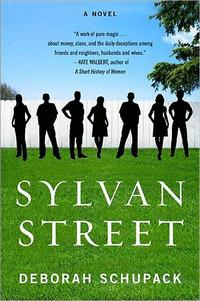 THE TAPESTRY OF TIME |
 Sunshine, secrets, and swoon-worthy stories—June's featured reads are your perfect summer escape. |

Purchase
Plume Books Fiction Excerpt of Sylvan Street by Deborah SchupackPrologue Eclipse June nights came pleasantly late on Sylvan Street, fully round the bend of day. This night, after dinners were eaten, baths taken and the earliest bedtimes accomplished, a dozen neighbors meandered onto the cul-de-sac to watch the partial eclipse of the moon. As the moon rose bright and full, talk among neighbors was at either extreme of the general or the particular. Generally pleasant weather, generally unpleasant economy, on the one hand. Geocentric coordinates of tonight’s moon and details of impending bedtimes, on the other. A couple of children waved flashlights while adults chatted, or didn’t. Light beams sharpened then dimmed as they touched surfaces then set out into the great night sky. Sylvan Street was as dark as any rural outpost. One was always reminded—whether by a loved one or by darkness itself—to carry a flashlight, even if one was only embarking on a simple trip to make inquiry of a neighbor or look for a pair of children’s shoes left on a dampening lawn. “Oh, here it comes,” someone said at the first sign of the moon passing into the earth’s umbra. Everyone who hadn’t yet done so extinguished their flashlights with a certain collective understanding. “It looks like someone’s erasing the moon,” a girl whispered to her mother, who nodded. Indeed it did, a smudge taking the edge off the moon’s crisp, perfect circle. “Supposed to last about a half hour,” someone reported. The shuffling of anticipation gave way to a hushed silence. There was a tensile, near-perfect feeling of community. For the time it would take a planetary shadow to pass, everyone would witness the exact same thing, and with no earthly consequence. The moon reddened as it grew obscured. It was now more in shadow than not. “Why is it red?” “Volcanic dust,” came one answer. “The glow of the penumbra?” came another, although as a question. A few clouds drifted into the celestial drama. “Pretty,” someone said. “Better than fireworks,” someone else said. The group rippled with wordless assent. After a time, a husband said to a wife, “Dramatic, huh?” The wife understood. “You want to head in?” she said. Similar domestic duets—nods to the wonder of it, followed by self-dismissal—and the crowd was down to seven . . . four . . . Finally, two: the young mother who had always been awed by celestial spectacles and the retired calculus teacher who knew the parameters of the eclipse’s totality and was committed to waiting it out. Janic Levlovic, the retired teacher, could not have told you whether this eclipse was pretty or not, whether it stoked a communal feeling of goodwill, whether it kept children up past their bedtime. He could tell you, however, the geocentric conjunction, the P. radius, U. radius and Gamma. He could tell you the eclipse’s umbral magnitude: 0.81, or eighty-one percent obscured, which was quite impressive and probably did translate to the layperson as “pretty.” He could tell you that in another eighteen years, eleven days and eight hours (one complete 6,585.3- day Saros cycle), a similar eclipse with similar geocoordinates would pass over Sylvan Street. If it was a clear night and if all was still relatively right with the world, especially Ashley-on-Hudson as it homed in on Sylvan Street, a similar collection of people might well drift out to a similar spot on the street and, hushed, gaze skyward. • • •
1 Pool Party Sally Levlovic tipped her face to the sun and watched out of the corner of her eye as Billy Cane dipped his foot into the pool. Meanwhile, Maggie Cane was doing all the setup, running around laying out the food, making drinks, schlepping towels and more towels. Sally suspected her own husband was falling for Billy in the same way Maggie had, seduced by a transparent sensual charm that you’d think would wear off pretty quickly for smart people like Maggie and Janic. Billy was lanky, sultry, beautiful to behold and easy to envy. But to spend a whole afternoon with him, as Janic was doing these days, let alone a lifetime, seemed dull to her, and a bit of a deal with the devil. “Yes?” said Shoshanna Yaniv, who was sitting in the chaise next to Sally. “Is there something I should know?” Sally had inadvertently been squeezing her new neighbor’s arm at the elbow. “Oh, my, no,” Sally said. “Just so happy to have you here. A new neighbor on Sylvan Street.” “I thought you wanted me to notice something about Billy Cane.” “No, no, the whole scene,” Sally said, thinking fast. “I just wanted you to take in the whole Sylvan Street scene. This is as good as it gets.” “Is that good or bad?” Shoshanna asked. “Beautiful blue sky, all of us gathered for the annual pool opening party at this beautiful house. . .” “Yes, nice,” said Shoshanna. “We feel lucky to be here. It feels like the country, but at the same time, Daniel’s commute to the city is really quick.” “Ah, commuters,” Sally said. “When we first moved here, the city was as far away as Atlantis. We talked about it like a distant, golden place. Now, so many of us commute every day. What brings your Daniel into the city?” “Advertising,” Shoshanna said. “Technically, it’s branding, but I’ve never gotten a satisfactory answer about how the two are different.” “All these newfangled careers,” Sally said. “We were teachers, Janic and I. Period, end of story. How about you?” “Me?” Shoshanna said. “The title, I suppose, is stay-at- home mom, but the kids are barely home anymore. Soccer, day camp, gymnastics, piano, martial arts. Not to mention school.” She gave a quick bio: born in Israel, came to the U.S. for Penn Law School. Then five years at a big Manhattan firm. Once the kids started arriving—she supposed she had expected more than two; that was the ancient Israelite in her—she left work. They left Manhattan for Brooklyn, where they were for seven or eight years. And now Ashley-on- Hudson. “That’s hardly nothing,” Sally exclaimed. Billy Cane was taking pool toys and equipment out of the shed. He wasn’t quite sure how this tradition had started, the annual pool opening party for the neighbors. He certainly didn’t come up with it, but neither did it sound like an idea of his wife’s—all the neighbors gathered at once, thinking how easy life was for Maggie and Billy Cane. Let them judge. Let them hold an outsider’s notion of Maggie and Billy Cane. He knew they thought he wasn’t good enough for Maggie. Which was a fine way to keep people out of his marriage. Maggie. Look at her! Her long black hair was shiny from an earlier swim; her green eyes could light the way in the dark. Maggie in summer. Maggie as he met her. Tan, freckled, windblown. She caught him looking at her and couldn’t help a smile. He squinted privately, almost a wink, and she, if he wasn’t mistaken, pursed her lips in a small suggestion of a kiss, freeing them to go their separate ways, united. He took out a couple of rafts. He reached behind the shed door for the backup skimmer, which he’d leave on deck in case any of the husbands—as often happened at these gatherings—wanted a chore. He pulled at the skimmer, but it was stuck, the end pinned behind a black briefcase. What a strange place for a briefcase, especially one that he’d never seen before. “Okay, who’s moving in?” he said, hauling the surprisingly heavy case out to the deck. No one looked up. “This isn’t yours, is it, Mag?” She looked over from then back to the hors d’oeuvre table, where she was rearranging fruit and iced coffee and juice boxes. Billy unlatched the case but clapped it shut almost immediately, with a whap that caught Ash Flemming’s attention, made him look up from his cell phone. “What?” Ash said. “A body?” “He’s kidding with that face, Ash,” Maggie said. “Right, Billy? What’s in there?” Billy shook his head, tried for nonchalance. Keith Margolis, who’d been digging through his wife’s jammed pool bag, looked up. Billy held out his palms, as if to show a dog, It’s nothing, and backed a few steps toward the shed. Janic Levlovic looked up from the Sunday Times crossword puzzle. Sally Levlovic propped her oversized sunglasses on her head and squinted. “What is it, William?” Shoshanna Yaniv sat forward in her chair. Daniel Hansen stopped trying to detangle the pool thermometer from the pool ladder. The Yaniv-Hansen kids stopped waiting for their father to detangle the pool thermometer from the pool ladder. “I don’t really know what to do,” Billy said. Jenny Margolis looked up from her Vanity Fair. Her twins looked up from the pool. April Margolis looked up from putting sunscreen on her bikini-exposed belly. Only Tiger Margolis, who was three, carried on, running around the yard naked and on his tippy-toes like he was in Hair! “Who says the economy’s in the tank?” Billy said. He unlatched the case and tipped it toward his neighbors. Not a single bill shifted. That’s how tightly the money was packed. • • •
9 Grand Plans Tasmin “Toomer” de Silva was the only guy still wearing a hat. Shit, he thought. It’s spring. Wasn’t it just yesterday they were kicking around in big-ass American hunting coats? Ducking and sliding around in fifteen fucking inches of snow. Frojones, they called to each other. Frozen balls. How the hell was it spring? Nothing ever happened. And still, time moved on. He stood at the edge of the Stop & Shop parking lot, kicking mud with the other foráneos. Younger guys, four, five of them, the ones without families, the ones who stood in the back and rarely got hired onto jobs. They’d bum cigarettes as the morning dragged on. Talk about the cold. Or the snow. Rain. How the weather was changing. What they did the night before. By ten, ten thirty, other guys gone, either to jobs or back home to try again tomorrow, the foráneos would start kicking around escape plans. Here was today’s: Haitian named Batista knew some guys who were moving oxy and Demerol. Had a prescription pipeline from Canada. Easy on, easy off the thruway. Batista was going to get in on it. Not run pharma—that wasn’t Bats’s style. But to double-cross. Get hold of that money. Make his move. Bats, making a move? That was a good one. —And I’m going to win the lottery. —I’m going to take over goddamn ICE, let all you guys in. —My mama’s going to come back to life. —And I’m going to be president of the United States— —No, ha ha, Bats is. —’T’s right. Bats’s voice was all island music, stories no more real than a song. No one believed him, and that was the beauty of Bats. No surprises. Sitting on that cement barricade on the south side of the lot. Just sitting.
—Jai, listen to what this guy Batista’s planning to do. But Toomer’s jai, his cousin brother, didn’t understand escape plans. Didn’t need to. Nishal had a job. Had the bed in the one-bedroom. Toomer had the couch. The couch, a hat, and nothing else. —Kid’s either blind or crazy. Outrun runners? You’re crazy, too, for believing him. —Tell me what else, then. What else? Again, Nishal promised. He’d get his jai-titi, little cousin brother, a job at the quarry. He would. Just let him settle in a little longer, win over the boss. Then he’d ask. He would. Where Toomer and Nishal came from, everyone lived crowded along the coast. The rest of the country, the inland center, was all rock. Toomer had his escape plan: learn to quarry, steal some tools, and go home to quarry the fuck out of the center of his country. Own all the land. Rey de la montaña. —Just wait. Little longer, little brother. —I’ll turn to fucking stone waiting on you and that quarry. —Good, titi. Keep you out of trouble. Nishal pictured going home, too. Not as rey de la montaña. His dream was even more impossible. Going home. To his mother and father, his brothers. To the cramped cement house and the smell of his mother’s cooking. A pot on the stove all day, poblanos, polenta, hominy, sopa. Rich smell of protein and a mother who loved her boys, even though she had too many. Five, six, seven . . . Each year, each new boy, his father stayed out longer and longer on the ocean, fish haul growing leaner. Until his heart gave out when he was fifty-one.
Foráneos attracted gaga girls. Gaga, meaning their mouths were hanging open, ready to do anything to anyone. And meaning that they were little more than babies. Fourteen, fifteen if you were lucky. Natasha said she was eighteen. Probably not, but close enough. She was different. She reminded Toomer of his twin sister. Stronger than him, clearheaded. Said what was on her mind. The mirror image of Toomer. The better half. He wondered what the hell she was doing there, kicking around the side of the Stop & Shop with the gaga girls and foráneos. Afternoon turned to evening. Evening to night. Four or five guys to two or three. Then just Toomer and Natasha. Sitting on a concrete barrier. Nowhere. She put her hand on his chest. —Your heart. He pulled his wool tope off his head. Felt like he might burst into flames. —Want to go get some dinner? —You buying? —You bringing? He didn’t even mean anything by that. You bringing? She laughed, all nervous and sexy, and he was glad he was holding his hat on his lap.
They went to Toomer and Nishal’s usual rice and beans place. The Truck. It was an actual rice and beans truck and a few aluminum picnic tables, wrapped in that clear plastic tenting with slappy plastic doors. Place was better now, winter gone. Those slappy plastic doors do dick against this frozen tundra. Upstate. Rippeskill, New Fucking York. Toomer had stopped complaining to Nishal about Rippeskill. (—You don’t like it, leave.) Where the hell else would Toomer go? So, by night, it was the couch, which sank in the middle. And by day, back aching like an old man, the Stop & Shop parking lot. But now, right now, he felt as young as he was. His girl! —Get anything you want. Tasha laughed. But he wasn’t joking. He’d swiped a twenty and a five from Nishal’s wallet. —I’ll have the lobster thermidor. His eye went to the menu posted outside the truck. —What number is that? —Number one million. As in millionaire. She tapped him on the forearm. He was still staring at the menu, confused. —I’m just joking. Saw it in a movie one time. Lobster thermidor is what the rich kids, spoiled brats, ordered in a restaurant. Don’t think they have it here. An image gathered in his brain—him and Tasha at a restaurant like the one she’d seen. He’d seen movies, too. Seen white tablecloths and rich kids and rich adults, stiff- fitting clothes that they never wore more than once. No reason he and Tasha couldn’t live like the movies. Have a couple kids—whoa, there, movies—let the kids order whatever they wanted. He brushed her hand with his. Pretending to be shy. Worked every time. They shuffled through the line, holding hands, until it was their turn to order. —Number six for me, the platter, with a Coke. And the lobster thermafare for my girl. —What number is that? Poor shit-for-brains girl in the truck leaned outside to look at the menu. Tasha touched his skin. Right at the top of his jeans. At the private hip. His balls tightened. He swore his cock could feel the twenty in his pocket. He was full of anything she wanted tonight. —Number one million. Shit-for-brains looked down at her register again. Back up at Toomer. Down, up, down, up. A bobble-head doll the chucochas sell on the street. —Aw, give her a break, T. I’ll have the number six, like you. And a Diet Coke. —Okay, T. Tamed for a moment, Toomer was happy. Excerpt from Sylvan Street by Deborah Schupack |
|
| |||
|
||||



 © 2003-2025
© 2003-2025